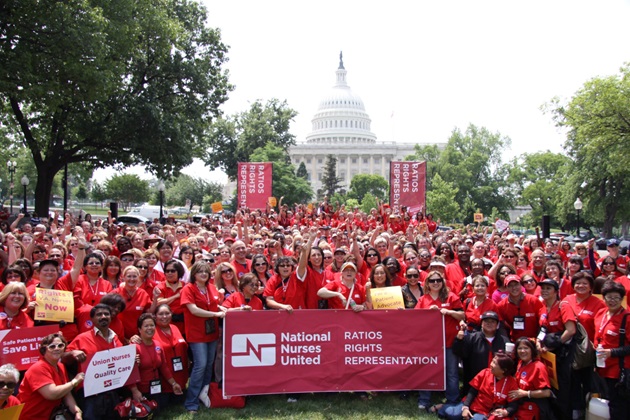What can we learn from American nurses growing a national movement to protect patient safety?
Back in 1992, nurses in California were at a crisis point. Unsafe staffing levels, excessive workloads and challenging conditions created by private employers had pushed them to their limit. Unable to provide the care they joined the profession to deliver, they chose to fight back, taking on the systems that had created the catastrophe.
Working as a union, they crafted legislation, got the support of patients, and built a campaign for safe nurse staffing that became formidable. They ran petitions, wrote letters to editors, told their stories, stormed the state capital and took to the streets, organising rallies, protests and marches.
They kicked off a revolution for safe patient care and in 1999 California became the first place in the world to pass legislation that puts a limit on the number of patients a nurse can care for at one time.
What was the key to their success?
A strong organising model and a strategy to recruit and train nurses as local leaders to drive their campaign from the ground up, says Michelle Mahon, a nurse and lead nursing practice representative for National Nurses United (NNU), the organisation that grew out of the California Nurses Association, which secured the legislation.
“Winning that victory was no accident,” she says. “It was the result of sustained and targeted action led by frontline nurses driven by the need to advocate for their patients. We hired community organisers to support and harness the power of our members. We created a sense of urgency behind the issue, capturing, using and amplifying the emotion underpinning the need for safe nurse staffing.”
They employed a strategy they describe as “elegant militancy”, which not only secured their desired outcome, but inspired nurses in other American states to start looking at how they too could become unionised to fight for better working conditions and improved patient care.
Membership of NNU began to grow, going from 18,000 members to more than 150,000 with active members in all 50 states. It’s now the largest professional association and union of registered nurses in US history.
Why should we care?
Well, the RCN is on its own mission to equip nursing staff to drive change, including securing safe staffing legislation in every part of the UK. Though Wales and Scotland are on the path, with laws being implemented, Northern Ireland is on its own journey and successive governments have so far been reluctant to accept that a law in England is needed to address safe nurse staffing.
In February 2019 we launched our safe staffing collaborative for England – formed of RCN members, reps and staff – to drive our campaign from the ground up. We’ve achieved a huge amount together, but effective influencing takes continual effort and we’re constantly seeking new strategies to support members to make change.
That’s why this January, Michelle and two colleagues from National Nurses United crossed the pond to share their experiences and reveal more about their organising model.
We can’t be effective nurses if we can’t be effective advocates, and that advocacy needs to go beyond the bedside
“It’s about creating the conditions that are the antidote to apathy,” says Gerard Brogan, a British nurse working in California who’s been central to the development of NNU.
“We know that we can’t be effective nurses if we can’t be effective advocates, and that advocacy needs to go beyond the bedside. Organising is about building strong networks and leaders within the workforce, educating nurses about how they can influence politically and building their confidence to challenge what they know is bad for nurses and bad for patients.”
So NNU invests a lot in their education programme, nurturing the leadership confidence of nurses to organise themselves in their workplaces and communities. “It’s building nurse power through knowledge,” says KB Burnside-Oxendine, who joined Michelle and Gerard on their UK visit and who works as an educator for NNU.
“We explain how the economic system of health care works in the US and how political decisions that create inequalities in society lead to poor health outcomes for patients. Nurses know the patients they’re seeing are often victims of a system that perpetuates economic inequality. Nursing is an inherently humanist profession, and our members understand that they can be part of a movement to challenge that system.”
Of course, this is the big picture, and while NNU members are committed to creating a better society, they also use their organising skills to fight for improved working conditions in individual workplaces. This might be anything from securing adequate locker space to negotiating better pay. Whatever the goal, they believe the ability to support nurses to organise is what enables them to effectively improve conditions.
And their fight for safe staffing goes on. California remains the only state in the US to have a law for comprehensive nurse-to-patient ratios, so NNU continues to campaign for federal and state ratios legislation, as well as support members to get minimum nurse staffing levels written into their contracts of employment, which they’ve done successfully in a number of workplaces.
What happens now with what we’ve discovered?
We're currently discussing plans to use elements of NNU’s approach to organising and will continue to seek advice from them in our campaign for safe nurse staffing.
Find out more about our campaign for safe nurse staffing and information about NNU.








